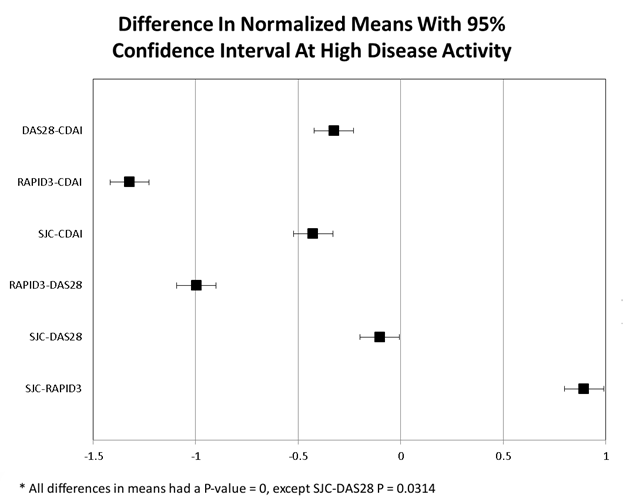Session Information
Session Type: ACR Poster Session A
Session Time: 9:00AM-11:00AM
Background/Purpose: Multiple composite RA disease activity (DA) metrics are approved for use; each reflect different aspects of disease. Many use similar measurements but their values are handled with different weighting, specifically the RAPID3 (R3) measures patient functional capacity rather than clinical measures of inflammation. Despite their use varying by problem it has long been realized that these metrics are not perfectly comparable. Further it is important to understand the impact of each and to select usage appropriately. In this study we analyze scores from multiple DA metrics for concordance within each DA state: high, moderate (mod), low and remission (rem).
Methods: Pts > 18 years and clinically diagnosed with RA in the JointMan database between 1 Jan 2009 and 4 Mar 2018 were included. Encounters for the Pts having DAS28, CDAI, RAPID3 scores and swollen joint counts (sjc) were selected and further filtered into four cohorts, high, mod, low, and rem. Each cohort contained only encounters where the patient was in its named DA state using all metrics. Encounters where a patient was in two or more named DA states were excluded. All DA scores and the sjc were normalized to Z-Scores on which was performed an analysis of variance. A TukeyHSD post-hoc analysis compared the individual cohort results.
Results: 4996 pts over 33,551 encounters were initially included, only 17.8% (5996 encounters) had DA state agreement (1470 high, 1785 moderate, 620 low, 2121 remission). The F values for each DA cohort were: High 461.9, Mod 1638, Low 2457, Rem 4824 and all had a P-value < 10^-16. All four scores compared had significantly different means at all disease activity states. The difference in means between SJC and R3 (0.945) at the remission state was particularly noteworthy.
Conclusion: Our results (especially with the meager 17.8% DA state concordance) suggest potential for wide variance in assessing DA state even with closely related measures. This may confuse clinical assessment & understanding of medication responses. Further, the discrepancy between SJC, a measure commonly used at office visits by clinicians to consider medication changes, and the functional measure R3, is concerning given the widespread use of R3 as a reporting metric. Prudence should be used when reporting DA scores and states.
To cite this abstract in AMA style:
Knapp K, Craig G. In Rheumatoid Arthritis All Disease Activities Are Not Created Equal [abstract]. Arthritis Rheumatol. 2018; 70 (suppl 9). https://acrabstracts.org/abstract/in-rheumatoid-arthritis-all-disease-activities-are-not-created-equal/. Accessed .« Back to 2018 ACR/ARHP Annual Meeting
ACR Meeting Abstracts - https://acrabstracts.org/abstract/in-rheumatoid-arthritis-all-disease-activities-are-not-created-equal/

